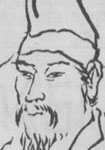
刘长卿(约726 — 约786),字文房,汉族,宣城(今属安徽)人,唐代诗人。后迁居洛阳,河间(今属河北)为其郡望。玄宗天宝年间进士。肃宗至德中官监察御史,后为长洲县尉,因事下狱,贬南巴尉。代宗大历中任转运使判官,知淮西、鄂岳转运留后,又被诬再贬睦州司马。德宗建中年间,官终随州刺史,世称刘随州。 刘长卿的古诗词
清明后登城眺望
风景清明后,云山睥睨前。
After the Qingming Festival, I climb the city and look into the distance.
The scenery is clear and refreshing, with clouds and mountains before my eyes.
百花如旧日,万井出新烟。
The flowers are as beautiful as before, and new smoke rises from a myriad of houses.
The flowers are still blooming as usual, while new smoke emerges from countless households.
草色无空地,江流合远天。
The grass covers the ground without any gaps, and the river merges with the distant sky.
The grass covers the earth densely, and the river merges with the vast sky.
长安在何处,遥指夕阳边。
Where is Chang'an? I point to the direction of the setting sun in the distance.
Where is Chang'an located? I point towards the setting sun in the distance.
诗意:
刘长卿在这首诗中描绘了清明时节的景象,表达了对家乡长安的思念之情。他通过描述风景的清明和云山的美丽,表达了自己对故乡的眷恋和思念之情。他感慨百花依旧,但是万物都在不断变化,形容了人世的无常和岁月的流转。最后他远望夕阳,思念着故乡长安。
赏析:
这首诗通过简洁而生动的语言,展现了作者对家乡的眷恋和思念之情。他通过描绘清明时节的景象,如百花依旧、草色浓绿、云山美丽等,将故乡的美好形象描绘得栩栩如生。同时,他也表达了对长安的思念和怀念,通过指向远方的夕阳,表达了对长安的向往和思念之情。整首诗抒发了作者内心深处的情感,给人一种温暖而宁静的感觉。
qīng míng hòu dēng chéng tiào wàng
清明后登城眺望
fēng jǐng qīng míng hòu, yún shān pì nì qián.
风景清明后,云山睥睨前。
bǎi huā rú jiù rì, wàn jǐng chū xīn yān.
百花如旧日,万井出新烟。
cǎo sè wú kòng dì, jiāng liú hé yuǎn tiān.
草色无空地,江流合远天。
cháng ān zài hé chǔ, yáo zhǐ xī yáng biān.
长安在何处,遥指夕阳边。